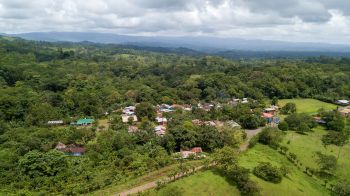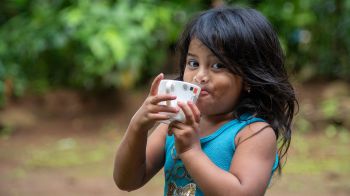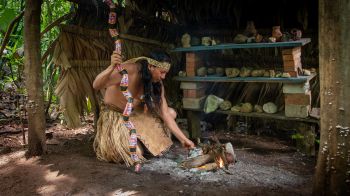Like most indigenous tribes the Maleku are permanently fighting for the preservation of its culture. The ritual dances continue to be taught and as always stories are told to the young boys by the elders about the tribes ancestors. In the villages the Tribes own language is spoken - Spanish is hardly heard.
The Maleku Indians comprises of approx. 800 members, who live on a government reservation, about 70 km from the Arenal volcano. The Maleku explain to us the origins of the earth: “Our ancestors said that at the beginning Toca a large stone opened - from that stone came a person, he said you are the people Maleku. Toca also created a large bird, the Red Ara, the holy bird. He said this bird would represent the symbol of my creation, the Great Spirit in you.”
The Maleku are proud of their indigenous roots and strive to preserve and retain their inherited culture. Although they live very closely with other Costa Ricans of European extraction, they, unlike the tribes of the Bribri or Borukas in the more inaccessible mountains of the Talamanca region, succeed in the upholding of their traditions whilst living in the modern age.
In strong contradiction is the image of the villages, which are hardly typical, having been constructed over the last decades by the Costa Rican government for the members of this indigenous culture. They correspond in smallest detail to the traditional method of building. Thus the villages of the Maleku sometimes remind us of the all too well known impoverished city outskirts that can be seen throughout Latin America.
The reason why the Maleku hold so strongly to its language and culture is certainly its distinct pride and a warlike spirit. In Costa Rica, they are regarded as one of the more warlike indigenous peoples.
When one visits the villages of the Maleku, you notice the colourful and beautifully made drums and tribal costumes. In almost all houses their lives an artist and often it is the whole family that is involved in the production of the indigenous arts and crafts. Ritual animal figures as well as the jaguar decorate the costumes and other objects of the Maleku.
The Teacher
Every day the teacher, Leonidas Elizondo is in two different elementary schools teaching the language of their ancestors and the culture of the Maleku to the young children in the schools. To get to the school in Tonjibe, a short foot march under the oppressive heat is required. However the neighbouring school in Magarita, one must walk four kilometres over dusty roads, sometime a motorcycle comes past and with some luck will give you a ride. In spite of the low wage and the poor situation of the schools, Leonidas is proud of his work, “One can only preserve the culture of the Maleku when we speak our language and maintain our customs.” After school a small group of young people learn the traditional dances of the Maleku. For the visitor they gladly give an insight into their culture, stories about the tribe that are performed in dance.
We asked Leonidas how life looks for the Maleku. He tells us: “We are small farmers and cultivate the traditional plants for our own needs. For example, Yukka, cook bananas, Pejibayes and corn. The fish we catch in the rivers are an important supplement to our daily diet. In order to survive many of us take jobs as day workers on the large Fincas owned by the white population. This is not for the entire year, but rather only during the harvest. For us, the arts and crafts are an important source of income. In order to sell our hand finished pieces, we must travel, often to San José.”
“In spite of all our problems we are proud that to a large degree we have preserved our culture. We nourish ourselves today much the same as our ancestors did and know the importance of our traditional ritual dances. Therefore we hold to the old tradition and ritual and bury the dead in our houses.”
“Today all our children learn to read and write. Also English, so that we can improve our lifestyle, but at the same time not forgetting our culture and traditions.” So we meet the children in the village of Tonjibe, who play soccer and tell us of the latest children’s films on television. They meet us again in traditional dance, dressed in typical costume that deepens the stories of their ancestors, naturally in their characteristic language. With only 800 people belonging to this tribe, it is a great achievement to have maintained its independent culture and language. Leonidas is very proud of that.
A day visiting the village of Tonjibe
In a visit to the school we meet the children and experience the language and storeys of the Maleku. The variety and diversity of nature is brought up close on a walk with the domestic leader. The tribe’s large wealth of knowledge, especially in the field of the medicinal plants is explained to you. How plants are used, for example in providing a local-anaesthetic, for the colouring of native fabrics and for healing a wide variety of illnesses. The fibres of a special tree are used by the Maleku in the making of their traditional costumes that are only worn at tribal ceremonies. We can also observe some of the tribal artists as they make typical musical instruments, tribal costumes and other native ornamental objects. The artistic amongst us can, under expert instruction take part.
A typical lunch is served on palm tree leaves that will restore our energy levels, the tribal chief will explain the Petroglyphen (stone characters) found in the village. We can visit the Tribal Healer who also runs the Tribes radio station; here we have the opportunity to learn more about the Tribe. A performance of native tribal dances at “Village-Rancho”, the traditional meeting place of the Maleku, forms the final highlight of the day.

We would like to thank all our guests who have been travelling with us since 1994 in the most beautiful time of the year - their well-deserved holidays. When developing itineraries for groups and individual travelers, selecting our local service partners and caring about the well-being of our guests, we always focus on the highest possible quality standards. Since the founding of Amadeus Travel, we have been committed to sustainable tourism as the only long-term viable form of tourism, e.g. through our social commitment, visiting and supporting private and state nature reserves as well as the training of our team and experienced, fully licenced tour guides.











 Book Now
Book Now 






